Genomics

Q &A with Ivan Woo on Paper, “Saturation genome editing of BARD1 resolves VUS and provides insight into BRCA1-BARD1 tumor suppression”
December 16, 2025 | by BBI Communications
BBI’s Ivan Woo, a member of the Starita Lab, is the first author on a new preprint paper contributing to the understanding of how changes in the BARD1 gene affect cancer risk
Read More
New VIS-seq Method Helps BBI Researchers Understand the ‘Why’ Behind Diseases Caused by Genetic Variants
September 02, 2025 | by BBI Communications
Subsequent work represents ‘the next frontier of variants effect modeling’
Read More
‘Imprecision Medicine:’ New Study Reveals Critical Gaps in How Patients are Informed About Genetic Variants and Their Updates
July 29, 2025 | by BBI Communications
Findings highlight how the burden of variants of uncertain significance falls unevenly on patients
Read More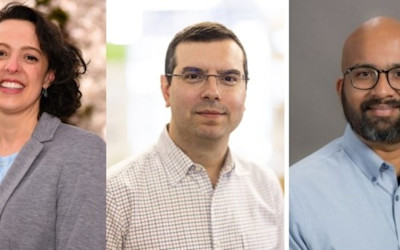
From Data to Diagnosis: BBI Survey Reveals Roadblocks and Opportunities for Using Functional Evidence in Variant Classification
June 17, 2025 | by BBI Communications
New survey among genetics professionals indicates a strong demand for a comprehensive database with standardized metrics to support using functional evidence in clinical variant interpretation
Read More
Paper Advances Understanding how Genetic Variations Drive Disease: Q &A with BBI’s Dr. Andrew Stergachis
March 17, 2025 | by BBI Communications
‘We were able to precisely resolve the genetic and molecular basis of (the individual patient’s) condition, thereby providing both her family and care team with answers to help support her moving forward.’
Read More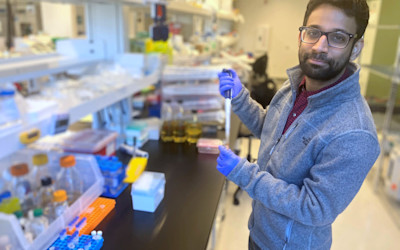
Q&A with Dr. Sudarshan Pinglay on Paper Regarding Structural Variants and Genome-Shuffle-Seq
February 12, 2025 | by BBI Communications
Dr. Pinglay and UW Genome Sciences researchers recently published, “Multiplex generation and single cell analysis of structural variants in mammalian genomes” in the journal Science. That study, in tandem with another paper by the Wellcome Sanger Institute, advance the study of structural variants.
Read More
Chan Zuckerberg Initiative Grant Advances BBI Research to ‘Democratize’ Access to Synthetic DNA
January 27, 2025 | by BBI Communications
‘Hopeful our work will enable not just us – but researchers everywhere – in a few years to readily obtain synthetic DNA’
Read More
Chan Zuckerberg Initiative Supports BBI to Better Understand Genetic Variants
January 06, 2025 | by BBI Communications
‘Critical step toward CZI’s mission to cure, prevent, or manage diseases by end of 21st Century’
Read More
New BBI Study Reveals Need for Gene-Specific Calibration in AI-Predicted Variant Effect Data
September 04, 2024 | by BBI Communications
‘Output from these AI models requires careful calibration before it can be used in clinical genetics…. Data must be tested against control variants and adjusted as needed.’
Read More
UW Genome Sciences Hackathon Leads to New Long-Read Sequencing Technology
June 11, 2024 | by BBI Communications
‘An opportunity to test a wide range of machine learning approaches’
Read More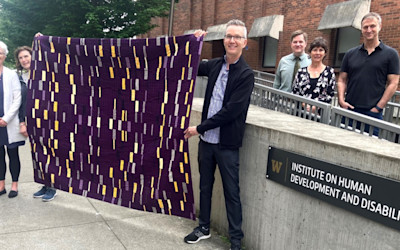
Genetic test analysis led to artistic expression of thanks
May 21, 2024 | by BBI Communications
Guild presents quilt to Genetic Medicine Clinic in appreciation of member learning her genetic variants
Read More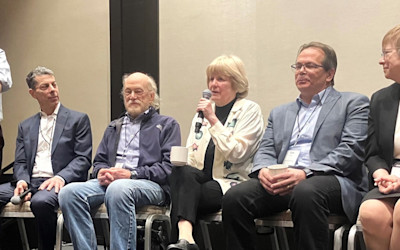
BBI Expert Panel Provides Insights about Human Genome Project to Trainees at NHGRI Conference
April 24, 2024 | by BBI Communications
Medical genetics ‘will become the soul of precision medicine in every field’
Read More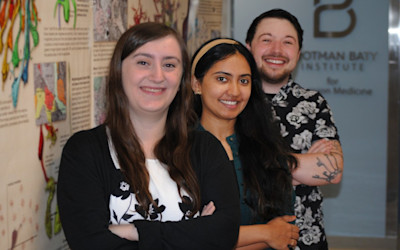
Long-Read Sequencing Consortium Offers PhD Students a Role in Addressing Precision Medicine Challenge
March 29, 2024 | by BBI Communications
Working under the direction of BBI’s Danny Miller, M.D., Ph.D., three graduate students, along with colleagues in the U.S. and five other nations, are working on research that promises to address one of precision medicine’s greatest challenges.
Read More
Birth coincides with rapid changes in gene activities
February 16, 2024 | by UW Medicine Communications
Time-lapse gene transcript profiling at the single-cell level during mouse prenatal development reveals this and other transformations.
Read More